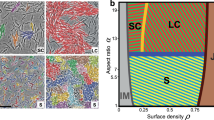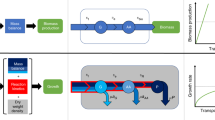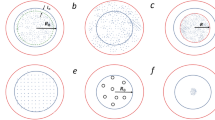Abstract
THE L-forms of bacteria, a study of which has been described recently1, are dwarf organisms derived from a complex transformation of bacteria, either spontaneously or under various noxious influences. Their morphological as well as biological characters are so different from those existing in the bacteria they are derived from that it seemed interesting to us to compare the chemical constitution of these two forms of the same organism.
This is a preview of subscription content, access via your institution
Access options
Subscribe to this journal
Receive 51 print issues and online access
$199.00 per year
only $3.90 per issue
Buy this article
- Purchase on Springer Link
- Instant access to full article PDF
Prices may be subject to local taxes which are calculated during checkout
Similar content being viewed by others
References
Tulasne, R., Rev. d'Immunol., 15, 223 (1951); Nature, 164, 876 (1949).
Tulasne, R., Vendrely, R., Minck, R., and Muller, L., C.R. Acad. Sci., Paris, 230, 152 (1950).
Schneider, W. C., J. Biol. Chem., 161, 293 (1945).
Author information
Authors and Affiliations
Rights and permissions
About this article
Cite this article
VENDRELY, R., TULASNE, R. Chemical Constitution of the L-Forms of Bacteria. Nature 171, 262–263 (1953). https://doi.org/10.1038/171262b0
Issue Date:
DOI: https://doi.org/10.1038/171262b0
This article is cited by
-
Nucleins�ure- und Phosphat-Haushalt bei Normal- und Hemmformen von Proteus vulgaris Hauser
Archiv f�r Mikrobiologie (1958)
-
Vergleichende Untersuchungen �ber den Nucleins�uren- und Atmungsstoffwechsel von Proteus vulgaris, dessen stabiler L-Phase und den pleuropneumonie-�hnlichen Organismen
Archiv f�r Mikrobiologie (1956)
-
Tierexperimente zur Frage der epidemiologischen Bedeutung der L-Formen
Zeitschrift für Hygiene und Infektionskrankheiten (1955)
-
Fehlerquellen bei der Begutachtung von Kulturen und mikroskopischen Präparaten pleuropneumonieähnlicher Organismen
Naturwissenschaften (1955)
Comments
By submitting a comment you agree to abide by our Terms and Community Guidelines. If you find something abusive or that does not comply with our terms or guidelines please flag it as inappropriate.



